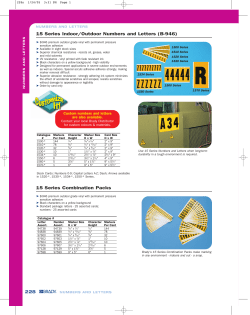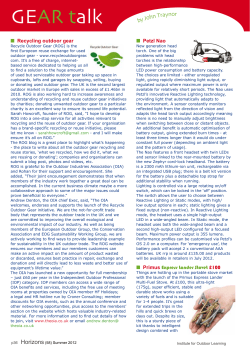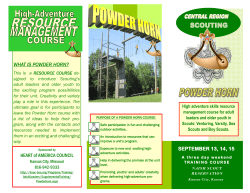
POSITION STATEMENT - Outdoor Education Group
OEG POSITION STATEMENT THE OUTDOOR EDUCATION GROUP POSITION TITLE: Outdoor Educator Outdoor Educator (Camp and Urban Based) Outdoor Educator (Journey and Expedition based) Specialist Instructor/ Activity Support REPORTS TO: Team Leader: (Head of Teaching Team (VIC or NSW) or Teaching Team Coordinator(VIC or NSW) or Head of Camp (VIC or NSW) ROLES REPORTING TO THIS ONE: Nil ROLES ACCOUNTABLE TO THIS ONE: Nil DATE LAST EDITED: April 2015 SIGNED OFF HoTT Tyler Johnson/ Georgina MacSmith, Head of Camp Jungai Eyrnn Cossartt-Walsh THE ROLE SUMMARY Outdoor Educators are members of the Teaching Team (based either in VIC, NSW, or a specific Camp) and are responsible for leading groups of students, maintaining their welfare and teaching the designated curriculum. Outdoor Educators (OEs) work with small groups of students (usually 12-14 students) on bush and journey based expeditions as well as centre based programs. An OE works in conjunction with a school staff member and, for some activities, other OEG or specialist staff, to minimise risk, maintain and promote the welfare of the group and it’s members, and to facilitate the learning of the core and specific curriculum. An Outdoor Educators fundamental responsibility is to lead their group in a manner that is both enjoyable and minimizes risk; their key purpose is to facilitate an educational process that empowers participants to reflect on, and learn from their experiences during the program. All OEs may be employed to work up to 0.8 load on journey based field (approximately 148 days per annum). Mandatory responsibilities 1. Lead groups in compliance with all of OEG’s risk management requirements; Required responsibilities 2. Facilitate effective group interaction and individual learning at all times (based on core values of respect and responsibility); 3. Develop effective relationships and team teach with the school staff member; and with any others (support staff, Assistant OEs) on program 4. Deliver the specified educational outcomes and facilitate a transfer of these to the participants’ homes/school environment as part of the ‘entire experience’. 5. Complete all rostered projects and other work to a professional standard and to meet the specified requirements of that work. Expected responsibilities 6. Practice and teach minimal impact camping; 7. Be accountable for the care of all gear, resources and equipment in your control. KEY RESPONSIBILITIES KEY OUTPUTS/MEASURES Mandatory responsibilities 1. Lead groups in compliance with all of OEG’s risk management requirements including (not limited to) Use an approved First Aid (FA) kit, Field Practices Manual (FPM), & incident reporting forms at all times; and submit reports as required Complete HIRA (Hazard identification & Risk Assessment) & variations; trip intentions forms Monitor & instruct students in campsite procedures and activity skills (including safety briefings) to a level that is consistent with program objectives and as required by the environment. Conduct daily scheds, weather checks, tree checks and other prescribed RM procedures as instructed. Seek support from CC/PL and/or AHC where you cannot manage an issue in line with FPM or other guidelines. Maintain all professional qualifications and log book. Required responsibilities 2. Facilitate effective group interaction and individual learning at all times (based on core values of respect and responsibility) Set appropriate standards of interaction early with the group (using full value contract or other method); Promote positive interactions of the group members collectively and individually to encourage their concepts of self worth, personal responsibility, team work, cooperation and individual effort; Page 2 of 5 1. Provide to the Program Leader for summary and attachment to the course report all (A) Risk Management documentation: FPM, incident forms (signed) HIRA, trip intentions Details of any issue (verbally at debrief & in writing if required by PL) not otherwise documented, that might be raised at school or with parents. Provide to Head of Teaching Team and/or Professional Development Coordinator (PDC) (B) Up to date qualifications and log book 2&3 Feedback on student outcomes and (C) school staff satisfaction will be provided by the PL/CC and reported in the course report: Outdoor Educators/field staff will receive a summary of all program feedback from Head of Teaching Team at performance appraisal, but may also request it at any time. Brief the PL on any issues where group or activity management or individual interactions were not positive or effective; and document if required. (Note that poor behavioural issues count as an incident to be reported on a “pink” form.) 2/04/2015 Use appropriate interventions and strategies (in consultation with school staff) if positive interactions are not evident and seek advice from PL/CC if these strategies are not effective. Demonstrate professional conduct at all times. 3. Develop effective relationships and team teach with the school staff member; and with any others (support staff, AOEs) on program Create time to discuss staff members’ understanding of program, desired method of working, any needs and concerns; Invite and encourage a “joint Teaching Team” approach with School Staff, utilising combined expertise and resources in decision making during the program; Seek feedback on staff members’ comfort and satisfaction; 4. Deliver the specified educational outcomes and facilitate a transfer of these to the participants’ homes/school environment as part of the ‘entire experience’. Read Essential Teaching Documents and any other information provided in briefing notes prior to program. Deliver the program with principle focus on the stated outcomes, and provide opportunities for transfer of the outcomes through review and reflection. Consult curriculum database for ideas and teaching tools to deliver programs Try new ideas and evaluate them through debriefs 5. Complete all rostered projects and other work to a professional standard and to meet the specified requirements of that work. Such work may include Student teaching at centres, Driving, packing Maintaining and auditing outdoor gear Track work, conservation work, facility maintenance at OEG centres and property, Training and professional development (incl team days) Assisting PL’s and SM’s eg Preparation for journey based courses, Student briefings at schools Outdoor Education & Curriculum projects, Community work, including day activities for local schools and groups, Administration work/projects Occasional maintenance and cleaning at Centres Page 3 of 5 4 Provide feedback on educational outcomes/program to PL through (D) Program debriefs (E) At bi-annual performance appraisal reflect on and discuss your delivery of educational content based on course reports and OE feedback forms and Evidence of at least 2 occasions/term you have utilised (or added to) the Curriculum database. 5 Evaluation should be captured in the most appropriate way (mix of formal and informal) – this might include “Project report” and feedback (verbal and written) by the project coordinator for any OEs involved Self reflection by OE (written )– bring to PA_PD Report by GL to T&L team and/or assessment by T&L following PD trips 2/04/2015 Expected responsibilities 6. Practice and teach minimal impact : Encourage discussion and behaviour that promotes Understanding of environmental impact and purpose of specific procedures eg water treatment & use, dish washing, toileting, fire management/fire bans Rubbish removal Respect for flora and fauna Respect for others’ (eg landowners, other campers etc) property and belongings . 6 Report any environmental or other damage to PL/CC. 7. Be accountable for the care of all gear, resources and equipment in your control Count all gear before and after program Use equipment and vehicles as instructed and/or consistent with manufacturers specifications; Report all loss or damage to PL/CC and gain school staff signature if this was through wilful carelessness or negligence; Participate in unpack, vehicle wash etc as instructed 7. Provide to PL/CC (F) all “operations” documentation including signed/counted gear forms signed loss or damage forms tags on all damaged gear completed vehicle checks ROLE BOUNDARIES /FREEDOM TO ACT (DECISION MAKING & PROBLEM SOLVING) An OE operates within clearly prescribed guidelines in regard to delivering activities, managing risk, using resources and addressing educational curricula. Within these guidelines is scope for individual judgment based on training and experience on how best to achieve these. The OE has “duty of care” for all participants to the extent that they act “in loco parentis” for minors (which are the majority of OEG clients). Clear thinking and judgment are required to achieve outcomes and manage risk especially when incidents require deviation from program outlines eg evacuations, environmental risk (eg fire, storm). This is usually supported by a PL/CC and/or All hours contact (AHC). KEY SELECTION CRITERIA/ Success Factors Client Relationships: Able to maintain professionalism and establish clear levels of communication with regards to needs of the program, in field program management & leadership. Builds a positive and supportive relationship, utilising co-leadership with teaching staff to support & manage group/individual needs. Can utilise internal systems effectively & timely to support and resolve in-field issues. Organisational Leadership: Adopts leadership strategies which account for changes to the group; individuals and nature of the program. Able to resolve issues and conflict in the field and through utilizing support systems. Able to develop a positive group climate in meeting program challenges. Page 4 of 5 2/04/2015 Risk Management: Manages the needs of the group and program in relation to wellbeing; safety briefings and safety management systems. Identifies and manages hazards on a continual basis. Utilises Risk Management systems to support program and group needs in a timely and efficient manner. Demonstrates knowledge of activity specific incident trends and traps Educational Delivery Utilises a range of facilitation practices to maintain an educational focus and create a positive learning environment. Applies teaching practices such as lesson planning, identifying learning preferences & utilizing teaching resources to support learning PREFERABLE SKILLS AND EXPERIENCE Camps/ Urban Outdoor Educator Certificate III or IV in Outdoor Recreation or equivalent experience in outdoor education or related field Sound judgement and decision making skills Adventure Based Learning and Facilitation Skills First Aid skill equivalent to Wilderness First Aid 7 day (60 hour) course, current CPR (yearly renewal), Current Police Check (Vic or NSW), manual driver’s licence OR a commitment to achieve this before starting. Journey /Expedition Based Outdoor Educator Certificate IV or Diploma in Outdoor Recreation or equivalent Minimum 2 years experience in outdoor education or related field Experience Facilitating groups in remote and wilderness environments Sound judgement and decision making skills Exceptional communication and group management skills First Aid skill equivalent to Wilderness First Aid 7 day (60 hour) course, current CPR (yearly renewal), Current Police Check (Vic or NSW), manual driver’s licence OR a commitment to achieve this before starting. Specialist Instructor/ Activity Support Currency and logged days in one higher level qualification in a given pursuit i.e Single/ Multi-Pitch Guide; Raft Guide; Ski Touring, High Ropes Management, Cycling Management Experience working in an outdoor educator capacity across a range of environments and program types (i.e centre and journey based) 3-4 years working in the field with groups Strong facilitation skills, judgement and decision making skills First Aid skill equivalent to Wilderness First Aid 7 day (60 hour) course, current CPR (yearly renewal), Current Police Check (Vic or NSW), manual driver’s licence, Taxi License, Light/ Medium Rigid License OR a commitment to achieve this before starting. Page 5 of 5 2/04/2015
© Copyright 2025











